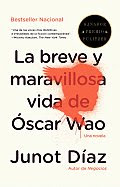emphasis on the wondrous
 When I was at a book festival in Houston last fall, Junot Díaz read from The Brief Wondrous Life of Oscar Wao. It was a passage about a young girl being roped into her mother’s self-breast exam; her embarrassingly enormous breasts were now home to a brooding tumor. A whole class of middle-school kids got up and walked out, led by their teachers.
When I was at a book festival in Houston last fall, Junot Díaz read from The Brief Wondrous Life of Oscar Wao. It was a passage about a young girl being roped into her mother’s self-breast exam; her embarrassingly enormous breasts were now home to a brooding tumor. A whole class of middle-school kids got up and walked out, led by their teachers.Was it the breasts? Was it the fact that the breasts and the passage were laced with dark and messy feelings? (Although I also kind of remember Junot Díaz swearing a bit in his introduction, which I found refreshing after a day of relentless wholesomeness.)
After reading the novel, I wonder if Junot would say this is how the first world deals with life’s ickier issues, collectively uttering, “The horror, the horror.” Oscar Wao is sort of a response to that. The story of a young Dominican-American man—a full-scale D&D nerd and seemingly perpetual virgin—who has inherited the fukú, the curse placed on his motherland and his family by the evilest of evil dictators, the novel asks just how one should view hopeless situations.
Díaz acknowledges that some bad shit has gone down in the D.R., and his characters spend much of the novel fighting uphill battles against corrupt leaders, rogue cops, cruel parents, cancer and weight gain. Oscar spends most of his short life trying to get laid. There are no satisfying cowboy moments in which The Individual takes down The System. Díaz even resists the more literary the-world-is-awful-but-here’s-a-glimmer-of-hope ending—or at least he writes it in his own distinct way.
As the thoughtful but pitiless, intellectual but wisecracking narrator Yunior learns from Oscar, waiting to be saved from the horror will get you nowhere. But fighting with all your guts and fingernails, and falling in love so hard it would make postmodern types blush will make the ride worthwhile. It’s a good sentiment for tough times.



Comments
I had the pleasure of meeting Junot in an event here in the DR a few months ago, after missing his lecture in the Annual Book Fair(still can't forgive myself) and he seems so down to earth and in touch with his culture that I could only laugh when I asked him what his parents though about winning the Pulitzer and he replied: "They congratulated me about "el premio ese" (that award), and asked me that if I was so succesful, how come I still don't have a car".
I think that life is what it is, and it's your response to it the defines you.